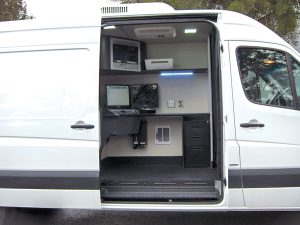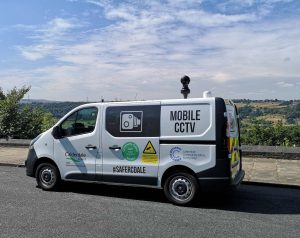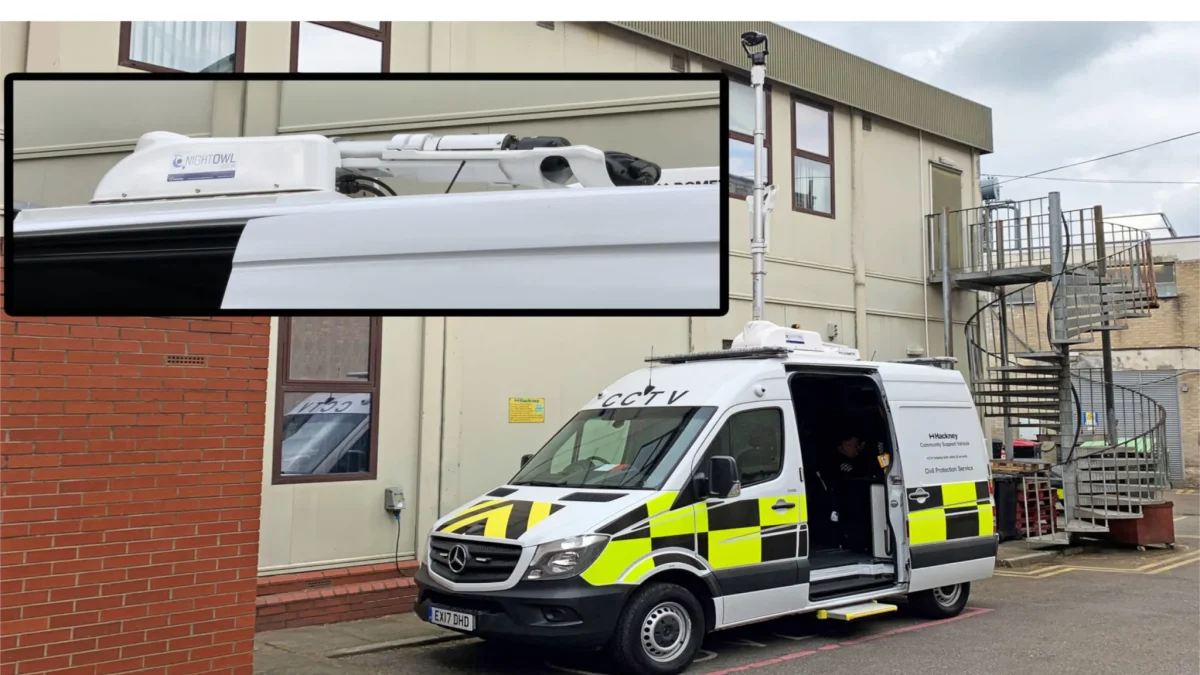Closed-circuit television (CCTV) has become essential to modern surveillance systems. It can monitor and record activities inside and outside a van and car, bringing about a significant change in security measures. CCTV technology offers advanced security and peace of mind. This article explores the advantages of CCTV for cars and vans, emphasizing their role in safeguarding valuable assets, deterring theft, their benefits, applications, and possible effects on highway security.
Table of Contents
ToggleWhat is CCTV for vans?

Understanding the usage and concept of CCTV for vans is crucial to enhancing the security of your vehicle. Safety and security are of utmost importance today, particularly regarding valuable assets such as vans.
This is where Closed-Circuit Television (CCTV) systems come into play, as many van owners and operators turn to them to protect their vehicles and contents. But what exactly is CCTV for vans?
Let’s explore the basics of CCTV and how it can improve van security in simple terms. CCTV, or Closed-Circuit Television, is a technology that enables you to monitor and record activities in a specific area.
In the case of vans, CCTV techniques consist of cameras placed strategically inside and outside the automobile. These cameras capture video footage of what is happening in and around the van, which you can view on a monitor or record for later use.
CCTV for cars and vans is an effective deterrent against robbery, vandalism, and other illegal actions. Visual cameras can cause possible wrongdoers to reconsider targeting a van.
If criminality does appear, the documented footage can supply valid proof for identifying and apprehending the culprits. You can gain several benefits from using these devices as a van or car owner, such as:
- One benefit of installing CCTV cameras in vehicles is that they can act as a deterrent against theft, vandalism, and other types of criminal activity, making the environment safer.
- CCTV in cars and vans can also help prevent fraudulent accident claims by providing solid evidence to disprove them, protecting innocent drivers from unfair legal and financial consequences.
- In cases of hit-and-run incidents, CCTV footage can be instrumental in identifying the responsible party and aiding law enforcement in their investigations.
- Another reason to consider installing CCTV cameras in your vehicle is to monitor driver behaviour, promoting safe driving habits such as obeying traffic rules, maintaining a safe distance, and minimizing distractions.
- CCTV footage can be used for training, allowing drivers to review their performance and identify areas for improvement.
- CCTV cameras can also assist with parking, helping drivers manoeuvre their vehicles in tight spaces and reducing the likelihood of collisions and damage.
- Lastly, CCTV cameras can contribute to overall security by deterring theft and break-ins and by providing evidence in the event of such incidents.
Benefits of CCTV for vans
Having CCTV installed in vans can significantly increase their security and protect their contents. It acts as a visible deterrent, collects essential evidence, and offers real-time monitoring capabilities, protecting against theft, vandalism, and other criminal activities.
Thanks to technological advances, CCTV for vans is becoming more accessible and practical, providing greater peace of mind for van owners and operators as they conduct their daily operations.
The main benefits of CCTV for vans are as follows:
- Real-time monitoring: CCTV systems often incorporate real-time monitoring capabilities, allowing van owners or security personnel to closely monitor the vehicle, especially in high-risk situations or areas.
- Safety for drivers and passengers: Interior CCTV cameras can improve the security of drivers and passengers by documenting any happenings or casualties that may appear.
The footage can assist in determining fault and provide valuable evidence for insurance purposes. When installing CCTV for vans, it is crucial to consider several factors.
Firstly, the placement of cameras should be strategic, covering both the interior and exterior of the van effectively.
Additionally, it is crucial to choose high-quality cameras that can grab straightforward photos and videotapes, even in low-light circumstances. Finally, the recording system should be secure and tamper-proof to ensure the integrity of the footage.
Many van owners and operators are turning to Closed-Circuit Television (CCTV) systems to enhance security and protect valuable assets. Although CCTV installation may seem complicated, it can be a straightforward process with some guidance.
The following section will explore the step-by-step procedure of establishing CCTV for vans, using specific terminology to assist you in securing your vehicle.
How to install the CCTV for vans?
Involves planning and preparing before starting the installation process. This includes identifying the areas of your van that require surveillance, such as the front and rear windows, side doors, and cargo area.
It’s essential to take note of any blind spots or vulnerable areas that require extra attention. Selecting the appropriate CCTV system is crucial for effective surveillance.
To choose the right system, consider the number of cameras needed, the camera quality, and whether you prefer a wired or wireless setup. Ensuring your chosen system is compatible with your van’s power supply is essential.
Strategic camera placement is critical to maximizing coverage. When installing the cameras, mount them in locations that provide a clear view of the intended areas while minimizing blind spots.
Typical positions include the top corners of the windshield, side mirrors, and the van’s rear. Ensure the cameras are securely attached to your van’s interior or exterior.
If you’ve chosen a wired CCTV system, you’ll be required to handle the cables from the cameras to the recording gadget. Carefully conceal the wires to avoid interference or tampering, and utilize existing gaps or conduits within the van’s structure whenever possible.
When installing CCTV for vans, connect the cameras to a reliable power source, such as the van’s battery or a separate power supply unit. Connect the cameras to the recording device, a Digital Video Recorder (DVR) or a Network Video Recorder (NVR), to capture and store the video footage for afterwards examination.
Ensure the cables are securely connected and follow the manufacturer’s proper setup and configuration instructions. Once the installation is complete, testing the system thoroughly is essential.
Check each camera’s field of view and change their situation if needed. Test the recording device to ensure it’s capturing clear and high-quality footage, and make any required adjustments to optimize the procedure’s arrangement.
What is the van camera kit?

Van camera kits can be crucial to ensure safety and security, especially for vans. They offer an all-in-one solution to enhance the safety of your vehicle and its contents by providing reliable surveillance.
In this section, we will explain the benefits and features of these kits in simple terms to help you understand how they can improve your van’s security when installing CCTV for vans. To begin with, it is essential to understand what a Van Camera Kit entails.
It is a complete container containing all the required details for arranging a management plan for your van. This typically includes several cameras, a digital video recorder (DVR) or network video recorder (NVR), cables, a power supply, and sometimes a monitor for viewing the footage.
Manufacturers design these kits user-friendly and easy to install and operate so anyone can use them. Investing in a Van Camera Kit has several benefits, such as:
- Deterrence: The presence of visible cameras can deter potential thieves or vandals. Knowing that you are monitoring them can make them think twice before targeting your van. You may also comprehend the importance of urban traffic management using CCTV as a deterrent.
- Evidence Collection: The cameras in a van kit capture video footage of any incidents or suspicious activities in and around your van, providing crucial evidence in identifying culprits and aiding in legal proceedings if necessary.
- Real-time Monitoring: Many van camera kits allow for real-time monitoring, allowing you to monitor your van remotely. This feature is handy if you’re concerned about the safety of your van in high-risk areas or when you’re away from it. Some security camera brands allow you to safeguard your van remotely, for instance, you can watch Hikvision CCTV on the phone while you are away from your van.
How to install a van camera kit?

If you want to install CCTV for vans, don’t worry – it’s easier than it may seem. By following a few straightforward steps, you can boost the security of your van and safeguard your valuable assets.
Proper preparation, appropriate system selection, strategic camera placement, and careful wiring and power supply connections are essential to a successful installation.
Once your camera kit is set up, you’ll have peace of mind knowing that your van is under surveillance, discouraging potential theft and ensuring that your vehicle and its contents are safe.
Some van camera kits also come with a Parking Assistance feature, which can be beneficial when navigating tight parking spaces or reversing. This part can assist in controlling casualties and decrease the hazard of harm to your van. Keep reading for a complete guide on installing a camera kit:
- Choose the Right Kit: Select a kit that fits your needs and budget. Consider factors such as the number of cameras required, camera resolution, and whether you prefer a wired or wireless system.
- Camera Placement: Position the cameras strategically to cover vulnerable areas of your van, such as the front, rear, and sides. Assure that they have a transparent line of sight and the tiniest obstructions. Some kits come with mounting brackets or adhesive options for easy installation.
- Wiring and Power Supply: If you opt for a wired method, run the cables from the cameras to the DVR/NVR. Hide the cables along the van’s interior or use existing conduits to keep a tidy and safe structure. Connect the cameras to an energy basis, either the van’s battery or a separate power supply.
- Connect and Configure: Connect the cameras to the DVR/NVR using the provided cables. Follow the manufacturer’s instructions to configure the method backgrounds, such as video rate and recording alternatives. Some kits may contain a monitor for direct viewing of the footage.
How to choose the best CCTV for vans?

Investing in CCTV for vans can be a wise decision to improve the safety and security of your van. These kits offer a range of features such as deterrence, evidence collection, real-time monitoring, and parking assistance, providing a comprehensive solution for van owners.
Evaluating a few critical aspects is essential to choosing the best CCTV for your van. Here are the first four factors you should consider:
- Determine Your Needs: Consider your specific requirements for the CCTV system. Are you more concerned about deterring thieves or capturing clear footage? Do you want to monitor your van in real time? Understanding your requirements will help you narrow down your choices.
- Camera Quality: The quality of the cameras is crucial for capturing clear footage. For optimal results, look for high-quality cameras (preferably HD) like Hikvision Turbo HD cameras to help you see the details. It’s also worth considering cameras with night vision ability to grab clear footage even in low-light situations.
- Number of Cameras: Think about how many sites you want to monitor in your van. Do you need cameras for the front, back, and sides? The size and layout of your van should choose the outstanding number of cameras. Remember that more cameras mean better coverage and a higher cost.
- Wired or Wireless: Two types of CCTV systems are wired or wireless. systems with wires need running cables from the cameras to the recording device, while wireless systems transmit video signals without wires. Wired systems can be more trustworthy but need structure results, while wireless methods offer flexibility but may be exposed to interference.
Factors in choosing the best CCTV for van

If you’re interested in increasing the security of your van, one smart choice would be to install a CCTV system. However, with so many options available, it can be overwhelming to determine which one would be the best fit for your van, or if you ride a car you may need CCTV for car which is needed to consider its own required qualifications.
But don’t worry, we’ve got you covered! In this section, we’ll provide some simple tips to assist you in selecting the finest CCTV for your van, following the previous section.
5. Recording and Storage: Thinking about how you want to record and save the footage is essential. Most CCTV systems contain a digital video recorder (DVR) or a network video recorder (NVR) for recording and holding footage. Ensure the recording device has sufficient storage capacity to meet your needs and consider additional features like motion detection or continuous recording.
6. Easy Installation and Use: It is preferable to look for a CCTV system that is user-friendly and simple to install. Some systems include installation guides or online tutorials to assist you with setup. Consider whether you want a system you can install yourself or prefer a professional installation.
7. Budget: Finally, it is essential to consider your budget. CCTV systems can vary in price, so it is critical to establish a budget range that you are comfortable with. Remember that investing in a dependable and high-quality CCTV system is an investment in the security of your van.
Choosing the best CCTV for vans is a manageable task. By considering your requirements, camera quality, number of cameras, wired or wireless options, recording and storage features, ease of installation and use, and your budget, you can find the ideal CCTV system for your van.
With the right CCTV system in place, you can have peace of mind knowing that your van is secure and protected. We hope you have a pleasant shopping experience and stay safe.
What is the wireless CCTV for vans?

If you want to enhance your van’s security, a wireless CCTV system is an excellent choice. It’s easy to use and convenient, allowing you to monitor your van without the hassle of running cables. So, you may need to investigate the best outdoor wireless CCTV camera system.
In this part of the article, we will guide you through wireless CCTV for vans, explaining what it is and why it’s a great choice. The first step is understanding what Wireless CCTV is for Vans.
Wireless CCTV is a surveillance system that allows you to monitor your van without cables. The cameras in a wireless CCTV system transmit video signals wirelessly to a recording gadget, such as a Digital Video Recorder (DVR) or a Network Video Recorder (NVR).
This means you can strategically place the cameras inside or outside your van without worrying about connecting them with cables. There are several advantages of Wireless CCTV for Vans, including:
- Easy Installation: One of the primary benefits of wireless CCTV is its simplicity of installation. You can save time and effort since there are no cables to run. Mount the cameras in your desired locations, connect them to a power source, and they’re ready to go.
- Flexibility: Wireless CCTV systems offer camera placement flexibility. You can position the cameras in various locations inside or outside your van, depending on your surveillance needs. This flexibility enables you to cover blind spots and vulnerable areas effectively.
- Minimal Interference: Wireless CCTV systems use advanced technology to reduce interference. They operate on specific frequencies, ensuring a stable and reliable signal transmission. This helps to maintain clear video footage without disruptions. Overall, wireless CCTV for vans is an excellent option for enhancing your van’s security and peace of mind while driving. It would help if you explored the Wireless CCTV Systems based on your budget and safety needs.
Why wireless CCTV for vans is better?
Using wireless CCTV for vans is an excellent option to increase the security of your vehicle. These systems are easy to install, give you the flexibility to place cameras where you need them, have minimal interference, and provide remote access capabilities, expandability, and portability, all of which give you convenience and peace of mind.
Choose a wireless CCTV system to monitor your van effectively and protect it from theft or vandalism. Doing so lets you enjoy all the benefits of wireless surveillance and keep your van safe.
Most wireless CCTV systems for vans offer remote access capabilities, which allow you to view live video footage or recorded videos utilizing your smartphone, tablet, or computer from anywhere with an internet connection.
This feature is like having your van under surveillance even when you’re not around! Moreover, wireless CCTV systems are often expandable, so you can count more cameras if needed and increase the coverage of your surveillance system in the future.
Wireless CCTV systems don’t require extensive wiring; they’re portable, and you can quickly move the cameras to a new vehicle if you need to change or upgrade your van without much hassle.
How much is the price of CCTV for a van?

If you’re considering installing a CCTV system in your van but need clarification on the cost, this guide can help you. We will define the aspects that influence the cost of CCTV for vans so you can understand how much you need to spend.
The quality of the cameras is a significant factor that determines the cost of a CCTV system. Cameras that offer high definition (HD) and advanced features such as night vision or wide-angle lenses are more expensive.
If you want high-quality footage, be prepared to invest more in better cameras. The overall cost of the CCTV system will also depend on the number of cameras you need for your van.
The more cameras you want to install, the higher the cost. You should consider the size and layout of your van and determine the areas that require surveillance. Balance your budget with the desired coverage.
CCTV for vans are available in both wired and wireless options. Wired systems may require professional installation, which can add to the cost. Alternatively, wireless systems offer more flexibility and easier installation, but they may be slightly more expensive upfront due to convenience.
A CCTV system’s recording and storage capabilities can also affect its price. Systems with larger storage capacities or advanced recording features like motion detection or continuous recording may come at a higher price point.
When comparing prices, consider your storage needs and how long you want to keep the footage.
Conclusion
Using CCTV for vans has been a real game-changer in surveillance and security. This technology allows van owners and operators to greatly decrease the hazard of robbery, destruction, and other illegal moves.
CCTV enables real-time monitoring and provides valuable evidence when required, ensuring a safer environment for drivers and passengers.
We can expect CCTV systems to become even more sophisticated as technology advances, offering enhanced features and functionalities further to improve the security of vans and other vehicles.
The cost of a CCTV system for your van will depend on various factors, including camera quality, the number of cameras, wired or wireless options, recording and storage capabilities, brand reputation, and the need for professional installation.
Evaluating your requirements and budget is crucial to finding the right balance. Remember, investing in a reliable CCTV system is investing in the security of your van.
Therefore, weighing your options, comparing prices, and choosing a system that suits your needs and budget is essential. We hope that you prioritize your safety and security.

